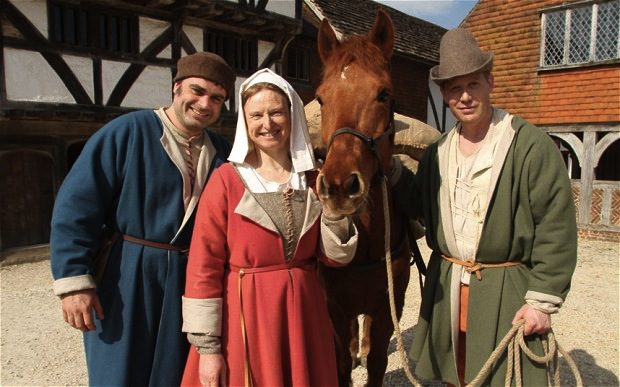A Glimpse Of What We Have Lost

Yesterday a reader recommended that I take a look at the 2013 BBC2 documentary/reality series Tudor Monastery Farm, episodes of which are available on YouTube. Last night I watched the first episode, embedded below, and it was really something else.
The show is part of an ongoing BBC series showing what farm life would have been like in various historical periods (Victorian, Edwardian, Wartime). In the Tudor version, a historian and two archeologists recreate what it was like to be a farmer under Henry VII, just before the English Reformation. Ruth Goodman, the historian, talks about what she learned from the experience:
‘I had such a happy summer I feel somehow lighter,’ says the 50-year-old historian, her eyes widening. ‘The lack of machines had an impact, as did the religious texts I was reading. We had to make a lot, too – even rush mats to sleep on – and I think there’s something about making things that’s good for the soul. I also got very good at spinning; I’ve done it before but now I’m practically an expert at turning sheep’s wool into yarn.
‘When we did the Wartime farm last year I didn’t really enjoy it, I felt ground down. But with this one I’ve felt such a connection with the countryside. It was like I really felt and smelled and tasted and touched what it was like to be on a Tudor farm. It’s been a bit of an epiphany. It helped that the main drink of the period was ale,’ she adds with another giggle.
Tudor Farm goes further back in time than the series has before. It’s the year 1500 and the reign of the first Tudor King, Henry VII. The Church was absolute and like many farms of the time – up to a third – Ruth’s is on land owned by a monastery.
‘What’s so interesting is that Protestantism hadn’t really made much of an impact in Britain and there was little science, so the Catholic Church was the only way of understanding the world,’ she says. ‘It felt unchallenged. I don’t think there’s a place anywhere in the modern world where religion is the only way of understanding things.’
Goodman is, and remains, an atheist. Funny thing is, watching that first episode made me, a Christian, feel an intense longing for the sacramentalism of the life those people had. Watch the episode linked above and see if you don’t agree with me. What I mean is the sense they had that God was everywhere, and that their lives had real substance because they were anchored in and ordered by the divine. I’ve been reading intensely for the past two weeks about the ideas involved in the medieval, Renaissance, and Reformation religious consciousness, but this is the first time in recent memory that I’ve seen a sense of what that must have looked like. (The recent novel Laurus, set in roughly the same time period, but in Russia, powerfully evokes the same sensibility.)
Yes, undoubtedly, we have gained a very great deal since those times. But we’ve also lost something precious.
Here’s a BBC guide to the six Tudor Farm episodes, which conclude with Henry VIII’s dissolution of the monasteries and the end of that way of life. I remember visiting the Salisbury Cathedral a few years back, and being stunned by the aesthetic violence the English Reformation did to the 13th century church. Tudor Farm brings to mind what it must have done to everyday life for ordinary Englishmen of the day.
UPDATE: Look, if you’re planning to make a remark about how the Tudors didn’t live this way because the show doesn’t re-enact disease and misery, spare yourself the trouble. I won’t approve it. I think we are all grown-ups here, and I think we all know that life in rural England in 1500 wasn’t a hobby farm. That has nothing to do with my point in this post. Furthermore, if you are planning to make a remark about how modern dentistry, air conditioning, and nookie-without-issue, etc., proves that we have nothing whatsoever to learn from our ancestors, don’t bore me with that Whiggish nitwittery. Stick to the subject of this post if you want to see your comment. It is possible to find truth and beauty in the lives of people in the distant past without affirming that they lived in Eden.
[youtube https://www.youtube.com/watch?v=t1ERDYjsHBg?rel=0]